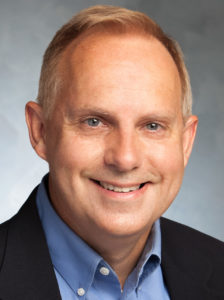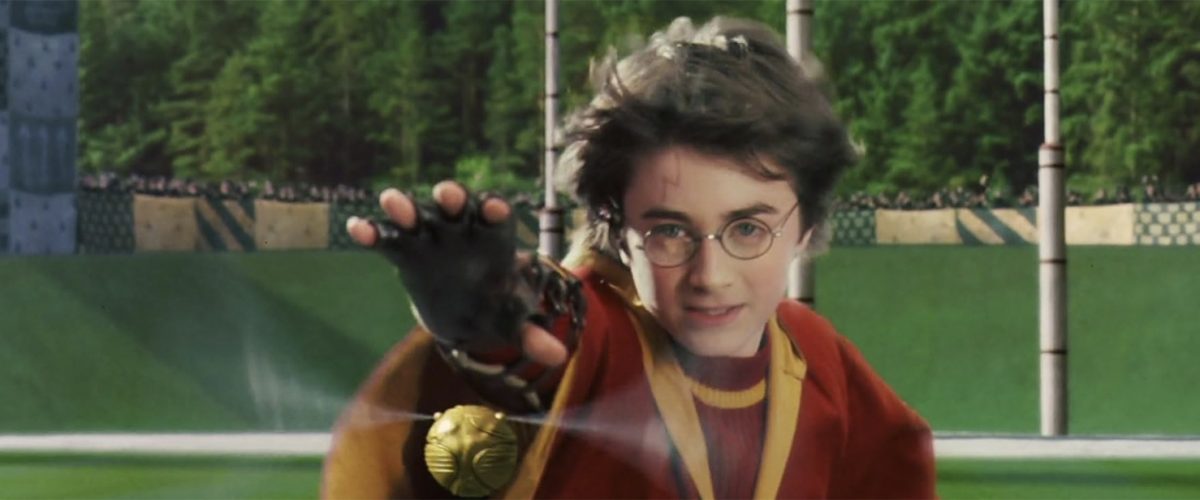May 2 is International Harry Potter Day, the anniversary of the climactic Battle of Hogwarts in the final Potter book, when love overcomes hate and death. It’s a very Easter kind of occasion, and intentionally so, according to author J. K. Rowling, who told interviewers years ago that her series would bear the imprint of the gospel narrative.
It’s also the last day of the Spring 2024 class for my Harry Potter students at Baylor University. It’s been an exceptional group. This semester they’ve built a loving community that celebrates diversity, they’ve developed as critics and thinkers, and they’ve discussed big issues with civility and respect.

Greg Garrett
One of those issues — the contrast between the values of love, compassion and acceptance embedded in the books and the recent social media posts of J.K. Rowling against trans women — came up in class a few weeks ago. Some of my students are gay; some have family members who are trans. They were wrestling with a familiar literary and cultural question: How do we balance works of art that are meaningful to us against the human failings of their authors?
As a professor, I do this calculation. After the “Me Too” movement, I’ve chosen to stop teaching the films of Woody Allen, although I think at least three of them are masterpieces. I’ve chosen to keep teaching the fiction of William Faulkner, whose clear-eyed literary view of Southern racism did not always make the transition to his personal life.
I did this calculus with Rowling after she began making transphobic statements in 2020. Several of the actors in the Harry Potter films have broken with her over them, and I chose not to teach the Potter class for several years although it has been both popular with and transformative for Baylor students. I decided to teach it again because students asked me to.
Our in-class discussion of Rowling before we turned to the day’s assigned reading parsed out the essential themes of the novels and contrasted their powerful ideas of community and inclusion with the pronouncements of what we have begun to call “Twitter Rowling.” The comparison is ironic, my class thought, and sad. The books deserve to be read, but they have to be held separate somehow from the person J. K. Rowling has become.
I posted about this conversation on Twitter on the Wednesday after our class. As a public-facing theologian, I use social media as a way of engaging and informing, and I wanted to share how my Harry Potter class handled this conversation and how these Baylor students chose love over hate.
Twitter has been a dead zone for me since Elon Musk took over. Folks who used to retweet me have left the platform. A typical post for me might get 1,000 views and a few responses.
But my Wednesday afternoon post on Harry Potter, J.K. Rowling, and transgender people went viral. I initially tried to respond in good faith to the flood of critics, but it became clear about an hour into that effort that 1) no one really wanted to engage on why a discussion of Harry Potter, J.K. Rowling, and diversity might be a valid academic pursuit, or 2) nobody wanted to hear that Jesus loves everybody, even the people they don’t like or understand.
I stepped away from social media because of a Thursday business trip to Washington, D.C., and while I was traveling and working, the right-wing media took up my Wednesday post as a cause célèbre. It had everything: scorn against higher education, attacks against “woke Baylor,” a communist/fascist/tyrant/pervert/groomer in the classroom indoctrinating innocent kids into trans deviants. (Turns out that last one is me.)
I realized things had gone crazy on Friday, when within seconds of each other I got texts from a conservative Baptist pastor and a progressive Episcopal priest asking if I was OK. Turns out a major conservative media figure was savaging me and Baylor online, and conservative media outlets were reaching out to me for a response.
I took a look at Twitter.
Instead of 1,000 views, this post had more than 2 million.
“I imagined a crowd of angry villagers from a Frankenstein movie, torches and pitchforks lofted on my front lawn.”
There were more than my usual few responses, almost all of them hateful, angry, indignant, insulting. Thousands of them. I imagined a crowd of angry villagers from a Frankenstein movie, torches and pitchforks lofted on my front lawn.
People, it was a lot.
I didn’t regret anything I’d posted — all of it represented my core values as a professor and as a pastor — but even though I write, study and speak on controversial topics like race, religion and diversity, I never before had stepped into a steaming pile of culture war.
Kenneth Malcolm, a dear friend from seminary, told me over dinner in D.C.: “They want to silence you. They want to kill you on social media, then they’ll move on to the next opinion they don’t like and try to silence it.”
I needed to hear this. At my most anxious, I did momentarily consider taking down my post, even shuttering my Twitter account. The volume of hatred, the screaming voices calling for my job, calling for Baylor to be investigated, calling me names no one’s ever thought to attach to me — it felt like I would never be able to go on Twitter again.
J.K. Rowling, the author of the Harry Potter novels (as my class has come to differentiate the early Rowling), is a master of dramatic irony. That’s a situation in a story where the reader or observer understands something that characters in the story don’t. And my students have said the dramatic irony of this story is that novelist J.K. Rowling, the young single mother on welfare, stands in direct contrast to Twitter J.K. Rowling, one of the richest women in the UK, who no longer seems to understand the books she wrote.
In the Potter novels, love is the most powerful single force in the universe; it is unstoppable, the Deeper Magic of which C.S. Lewis wrote. Hate is the province of Lord Voldemort and his Death Eaters, and at the Battle of Hogwarts, love, hope and community prove more powerful.
Still, it is one thing to recognize dramatic irony and another to try to fall asleep alone in a D.C. hotel room with an angry virtual mob at your front door.
After a meeting at Washington National Cathedral on the Monday after my Wednesday post, Pastor Ralph Douglas West and I were discussing this kerfuffle as we drove to lunch. He threw Genesis 50 at me, the passage where Joseph encounters the brothers who sold him into slavery and now stand before him begging for food.
“G,” Ralph told me, “they intended it for evil, and God will turn it to good.”
I leaned hard into that because it is the heart of my belief. And to be sure, despite the thousands of hateful messages, I picked up new Twitter followers who maybe resonate with the idea that Jesus loves everybody. I received affirmations from Baylor alumni, donors, regents, faculty, students, administrators.
“And I thought: This is all that matters.”
I heard from a beloved former student who revealed she had been closeted at Baylor and who thanked me for standing up for her and people like her.
And I thought: This is all that matters.
Everything else is just noise.
So I got back on Twitter — my original post now at 2.8 million views — and I posted this from Desmond Tutu:
Goodness is stronger than evil;
Love is stronger than hate;
Light is stronger than darkness;
Life is stronger than death;
Victory is ours through Him who loves us.
Argue with this if you like was my unspoken subtext, and not surprisingly, some of them did, or made fun of me as weak and woke for posting it.
But it’s dramatic irony. We understand something they don’t about Easter and about Harry Potter. The seven novels echo every word of Archbishop Tutu’s prayer, and wherever it is that Twitter J.K. Rowling winds up, they always will.
So I will celebrate this Harry Potter Day, as I lament the final day of class with my wondrous students, and I will look forward to teaching these books again because they celebrate diversity, courage and, yes, faith, thanks be to God.
And I’ll probably post just that on Twitter.
Pray for me.
Greg Garrett teaches creative writing, film, literature and theology classes at Baylor University. He is the author of two dozen books of fiction, nonfiction, memoir and translation, including the critically acclaimed novels Free Bird, Cycling, Shame and The Prodigal. His latest novel is Bastille Day. He is one of America’s leading voices on religion and culture. Two of his recent nonfiction books are In Conversation: Rowan Williams and Greg Garrett and A Long, Long Way: Hollywood’s Unfinished Journey from Racism to Reconciliation. He is a seminary-trained lay preacher in the Episcopal Church. He lives in Austin with his wife, Jeanie, and their two daughters.
Related article:
Portents in the heavens and signs of the times: An eclipse, Harry Potter and a scholar changing his mind all in the same week | Analysis by Mark Wingfield


